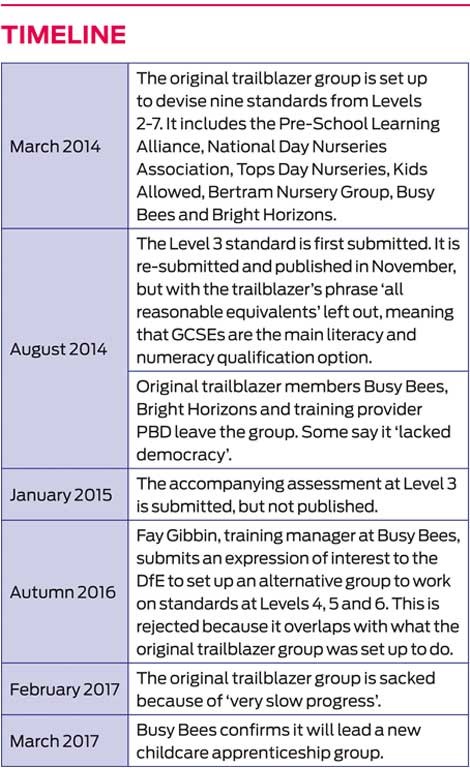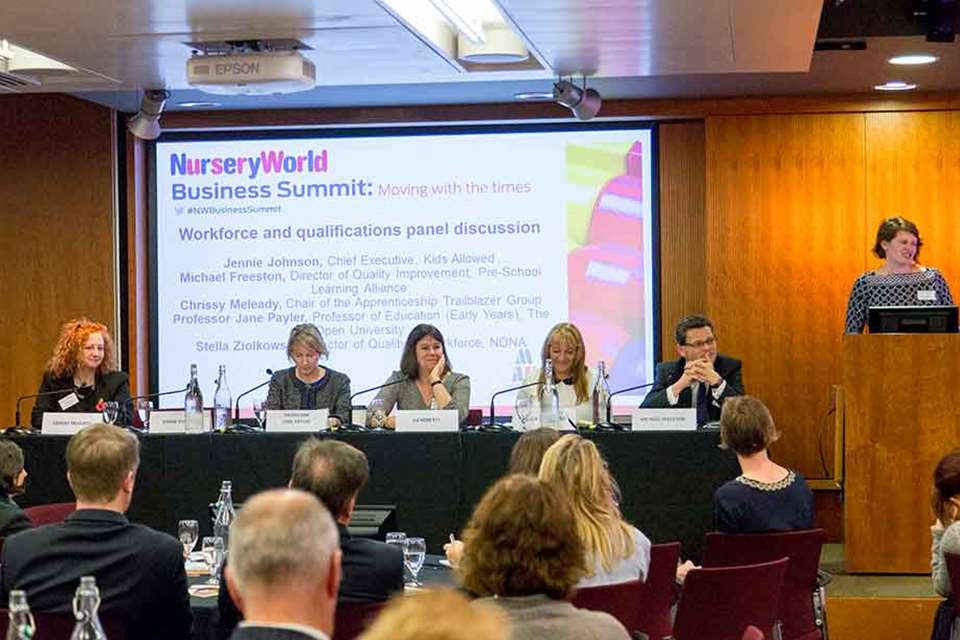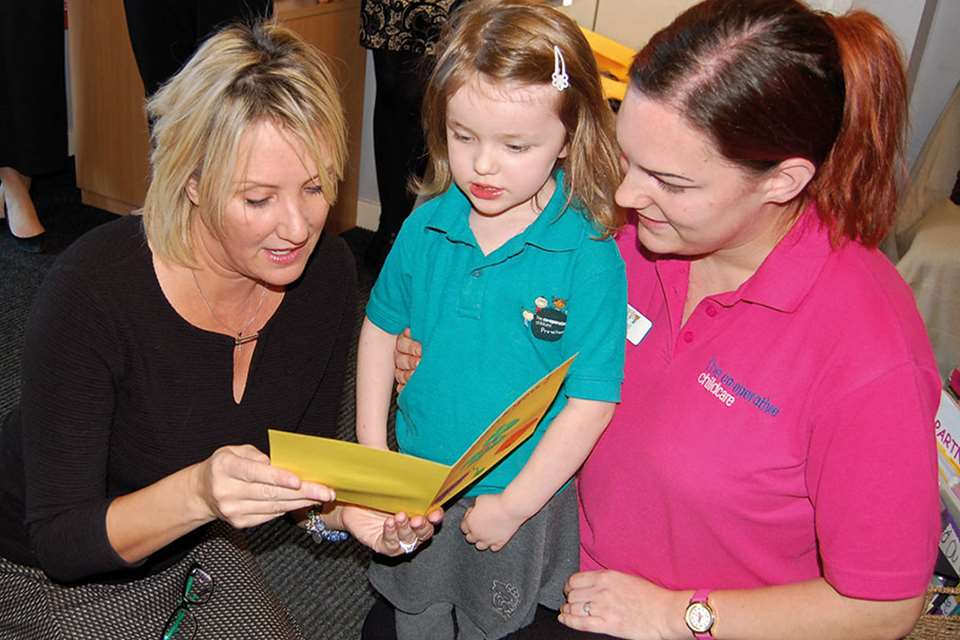Nursery Management: Apprenticeship Roundup - Slow progress
Monday, March 20, 2017
The deadlock over GCSEs at Level 3 has set early years apprenticeships back years. Following the Government U-turn and the sacking of the trailblazer group, what now? asks Hannah Crown

The apprenticeship levy, which comes in next month, is supposed to herald a new dawn for apprenticeships: three million are to be created by 2020, with the new funding system intended to make this possible. But for the early years sector, things aren’t looking so rosy, despite the Government’s insistence on GCSEs for Early Years Educator qualifications at Level 3 finally collapsing early this month.
At the forefront of the movement to re-instate functional skills, which spawned a campaign group called ‘Save Our Early Years’, were the trailblazers. Yet the trailblazer group has won the war but lost the battle, having been sacked in February over the ‘very slow progress’. The DfE says the trailblazer group published only one out of nine standards in three years.
Now things are turning bitter with the group’s two former chairs making allegations of Government ‘victimisation’ over the GCSEs issue. Meanwhile, a new trailblazer group has been set up by nursery group Busy Bees to take the work forward. And fears over funding continue.
STANDARDS
Trailblazers were set up as a representative group of employers designed to ensure that new employees get the skills they need. In 2013, the Government said, ‘Under the reforms, employers will be put in the driving seat to create new apprenticeship standards that will deliver the skills businesses and learners need to compete in the global race.’
Following the sacking of the early years trailblazer group on 17 February (see timeline), Chrissy Meleady of Early Years Equality told Nursery Worldthat the group was ‘in an impossible position from the start’.
She said members of the group had told the Department for Education that, ‘The group is strongly of the view that it is the Government’s failure to bring to a conclusion the impasse over the recognised equivalencies to GCSE maths and English which has led to the failure to secure all nine early years standards.’
Ms Meleady said, ‘The GCSE equivalents result is a great thing for the sector. We initiated and held the line at the request of employers in this three-year battle to get this result, and other organisations then joined in. Just two weeks before the Government backtracked on the GCSEs, they stood us down.
‘The Government wanted us to change our position on wanting the reasonable equivalents to GCSEs, and leave it for the minister to decide – despite the fact we were told it may not be a favourable outcome.
‘I felt we were bullied, threatened and intimidated to drop the sector employers’ request for reasonable equivalents and also to hand over the work we had done on the standards and assessments to an alternative trailblazer group. As chair I have been seeking legal advice about how we were being treated and the more recent decision to stand us down.’
The first and only trailblazer standard to be published, in November 2014, was the Level 3, with the employers’ wording altered by the DfE so that the phrase ‘all reasonable equivalents’ was removed, leaving GCSEs as the main English and maths qualification option. The associated Level 3 assessment has not been published, but the group says it was submitted in January 2015. Ms Meleady says that in fact all the standards had all been developed in draft, and submitted to Government officials, but could not be submitted formally until the impasse over the GCSEs was resolved.
Cheryl Hadland, who chaired the group before Ms Meleady, and remained a member, agrees the group has been victimised. She adds, ‘Less than a week after accepting chair of the group, it was made clear that the trailblazer brief did not apply to early years; instead we were expected to ratify decisions already made by the DfE. All suggestions to do otherwise were disrespected and instead we were flooded with loads of paperwork, and hoops were changed in retrospect. To now blame us for their refusal to accept no to GCSEs being mandatory, with no equivalents, is no surprise given their behaviour throughout, but also a sad day for democracy. Chrissy deserves a medal for continuing to fight for what we knew was right for the sector for so long.’
She adds the group had carried out extensive consultation, with focus groups being held around the country, while Ms Meleady estimates that 80 universities were consulted.
Carolyn Silberfeld, chair of the Early Childhood Studies Degrees Network, has worked with the trailblazer group on the standards and assessments in development in an advisory capacity. She says the group’s work had been ‘robust’, adding, ‘The trailblazers have been put in a very difficult situation by the Government, with the uncertainty about GCSEs.
‘I would support reinstatement of the group - it would be a retrograde step to appoint another. The trailblazers have tried to address all issues but keep a quality programme, and I think they have done a very good job. I hope the standards, when they come out, are based on what the group has done.’
Earlier this month, skills minister Robert Halfon said, ‘All nine standards that the Early Years Trailblazer was approved to develop in 2014 remain in development. We are committed to ensuring all standards and assessment plans are developed in a timely manner. We have therefore notified the trailblazer that we have withdrawn their right to develop these standards.’
A DfE spokesperson made no comment on Ms Meleady’s claims.
RIVAL TRAILBLAZERS
An alternative group was set up two years after the original trailblazer was formed (see timeline). Led by the UK’s largest nursery chain Busy Bees, which left the original trailblazer group (along with Bright Horizons) after the Level 3 standard was published, it is comprised of 13 nurseries plus Birmingham City University.
Fay Gibbin, the group’s training manager, responsible for the training of 1,500 apprentices, submitted an expression of interest in developing standards at Levels 4, 5 and 6 last year, including a one-year course for an early years advanced practitioner (Level 4). The expression of interest was rejected by the Government because of overlap with the existing trailblazer’s work.
Three of the nurseries in the group were Busy Bees nurseries, while others included Blossom Day Nursery in Basingstoke and Shapes Day Nursery in Coventry (both listed twice).
Ms Gibbin confirmed to Nursery Worldthat Busy Bees will lead a new trailblazer group, which she says will review and develop the Level 3 EYE standards produced by the former trailblazer. The DfE says it has also been approved to develop standards for two-year courses at Levels 5 (Early Years Senior Practitioner) and 6 (Early Years Lead Practitioner).
Ms Gibbin says, ‘From the very beginning, our intentions were to develop the standards for Level 5 and 6 apprenticeship frameworks to provide our childcare practitioners with a total career path from Level 2 up to degree level. In order for an employer to express interest in developing a set of standards, it must demonstrate support from that sector and provide details of the proposed employer group.
‘When forming the group to develop the Level 5 and 6 standards, we made it clear that each employer needed to appreciate the time commitment involved. The group has been carefully formed and consists of organisations that represent the sector, already actively support apprenticeships, and those that recognise and understand whole sector challenges.
‘We were always fully aware that the original trailblazer group had the rights to develop the apprenticeship standards from Level 3 through to level 6. However, following the dispersal of the group in February 2017, Busy Bees were then approached by the Department for Education to review and develop the Level 3 EYE standards, which we have now agreed.’
She adds that the group is going to carry out a wider consultation with employers on the Level 3 standard.
Busy Bees has previously said functional skills are ‘a credible alternative to GCSEs, and would like to see the Government reconsider its decision not to allow these as an alternative’.
A DfE spokeswoman says, ‘Quality is at the heart of our apprenticeship reforms. In recognition of that, we have approved a proposal led by Busy Bees Childcare to develop standards covering early years occupations.
‘The trailblazer will build on existing work on the standards, ensuring that they are up to date and meet the needs of the sector.’
The spokeswoman adds that standards are not necessarily needed at every level, and the new trailblazer will carry out ‘mapping work’ to identify the sector’s requirements, hinting that some of the previous draft standards coud be dropped. ‘We will be supporting the trailblazer to ensure they can make quick progress,’ she says.

FUNDING
Meanwhile, there may not be enough money to pay for a controversial new system for apprenticeship funding in SMEs (co-investment, or mandatory cash contributions) in the long term, sector leaders claim.
The Government’s apprenticeship levy, which comes into force next month and is a tax on the largest businesses in the UK, had been designed so that funds left unspent would roll on into the separate co-investment system used to fund apprentices in SMEs.
Yet according to the sector experts, large employers want to see all of their investment returned, and are planning to spend all of their contributions – meaning there may not be any money left.
Andrew Gladstone-Heighton, policy leader at qualification awarding body NCFE, says the potential lack of rollover funds is a ‘common concern’ in the sector. He adds, ‘To fund non-levy-payers [SMEs], the Government are counting on levy-payers not recouping all their costs, leaving a surplus in the overall levy system. As far as I can tell, there is no official government document that provides clarity on the above issue. I’ve been given personal reassurance from senior sources at the Apprenticeship Delivery Service that the modelling that policy-makers have undertaken has shown that the levy system will create enough surplus to keep the supply of cash available for the 90 per cent funding of non-levy-payers.’
But he adds he hasn’t seen the evidence. ‘The only real analysis I’ve seen on this matter has been through commentators and fellow policy analysts outside of government.’
Mark Dawe, CEO of the Association of Employment and Learning Providers, says, ‘Unless the Government guarantees a minimum £1bn in annual funding for the apprenticeships of small businesses over the longer term, we may have only a short window of two years to meet demand for apprenticeships in nurseries before the sector faces a major skills challenge again.’
The Treasury had predicted in 2015 that the levy would raise £3bn in 2019/20, but in last’s year’s Autumn Statement, Government forecasts suggested that the levy would raise £200m less.
The DfE was unable to comment.
What’s more, the amount of money being allocated to the early years apprenticehsip framework is controversially low. The former trailblazer estimated that an apprenticeship costs £8,000 to deliver, yet the maximum price cap for a Level 3 apprentice is now £2,500 before top-ups, leaving a huge potential shortfall.
Ten per cent of this would be payable by the employer under the new funding system for SMEs coming into force in April, with the rest paid by the Government.
Last year, providers calculated that the new system could mean certain apprentices face funding cuts of over half. Ross Midgley, director of training company PBD, says providers accepting 16- to 18-year-olds on Level 3 courses in the most deprived areas of the country face cuts of 42 per cent in funding on the previous system.
AELP and others have said this doesn’t fit in with the Government’s new social mobility agenda.
Mr Midgley will be charging employers £240 for a Level 2 apprenticeship or £300 for a Level 3 apprenticeship including VAT, as a one-off upfront payment, saying his profits will take a hit to support this. He says, ‘Training providers will have to become more efficient, less profitable or cut quality. I am confident we can maintain our quality in the face of this, but I am a lot less confident that quality across the board won’t be impacted.’
This situation is, however, temporary – the funding rates only apply to apprenticeship frameworks, which are being replaced. When the new standards finally come in, apprenticeships are expected to be relatively better funded, Mr Midgley says. But there will be extra new costs associated with an end-point assessment (estimated by NCFE to be up to a fifth of the cost of the standard), to be carried out by an external company.
The new system sets an important precedent, says Mr Midgley. ‘Once the Government moves away from zero employer contribution, they can move from [the current contribution of] 10 per cent to 20 per cent [in future]. They are trying to establish the principle that employers have to pay for apprenticeships.’
He is despondent about their future in the early years sector.
‘The Government seems to be doing absolutely everything they can to incentivise learners to go another route than to get an apprenticeship.
‘Particularly in the early years, you don’t need an apprenticeship at Level 3, you just need an EYE qualification – that is what gives you licence to practise.
‘I don’t think it’s any exaggeration to say if the end-point assessment is made any more difficult, or if the funding gets any tighter, then I don’t think we will see early years apprenticeships at Level 3.’
When he was Secretary of State for Business, Innovation and Skills, Sajid Javid said the ‘levy will put employers at the heart of paying for and choosing apprenticeship training, and place the funding of apprenticeships on a sustainable footing’.
A DfE spokesperson says, ‘We have doubled funding for apprenticeships to £2.5 billion by 2019-20 – twice what was spent in 2010-11.’
SCHOOL'S OUT
In another twist, maintained schools face levy bills of thousands of pounds they can scarcely afford, according to the National Association of Head Teachers.
The union’s head of policy, Valentine Mulholland said the levy was ‘just a tax’ which came ‘at a time when schools are having to meet enormous costs’.
She said, ‘If we look nationally less than 2 per cent of all employers are going to have to pay the levy [but] all maintained schools are going to have to pay it - those that can least afford it.
‘This is just going to be a tax. The public sector will not be able to make use of the apprenticeship levy because there isn’t enough opportunity for apprentices and they are not geared up for it. I think local authorities are going to struggle to spend it and a lot of money is going to back to HMRC. They have had to make significant cuts. You need a dedicated team to deliver this and set it up and the levy money can’t be used on that.’
The levy will apply to maintained schools because their staff are technically employees of councils, which have paybills over the qualifying £3m threshold. Schools that Nursery World has spoken to have estimated it will cost them between £2,000 and £7,500.
Judy Shaw, Headteacher, Tuel Lane Infant School, said her annual income next year would be £675,910, half of which is salary costs. She said, ‘The apprenticeship levy will be £1962.49. In setting the budget we now have to consider whether we take this directly from our allocations for staff training and development or from curriculum resources. The governing body will decide which funding pot to reduce with a heavy heart knowing the impact will be felt in our learning environment, our classrooms, the resources available every day to our children, and/or CPD for staff.’
NAHT asked for a meeting with skills minister Robert Halfon on the issue. Mr Halfon said, 'In the majority of cases, local authorities will be responsible for paying the levy in the community schools they maintain. We expect these schools to have full access to funding for apprenticeship training and will support all employers, including schools and local authorities, in using levy funds to invest in quality apprenticeships.'
Maintained schools can take childcare apprentices. St Helen’s College, Merseyside, says its level 3 childcare apprenticeship ‘is suitable for those currently employed in this sector or looking to secure employment within this sector ...[they] often work within a nursery, early learning and childcare setting, providing care for young children and/or deliver the early year's foundation stage within a maintained school setting.’
Schools are having to collectively make over £3bn of savings by 2020, according to the National Audit Office.
A petition against the funding is here: https://petition.parliament.uk/petitions/176893









